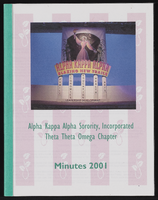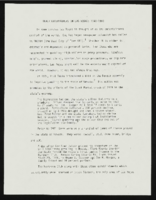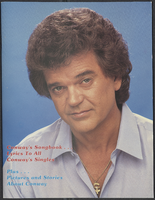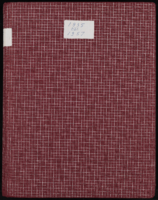Search the Special Collections and Archives Portal
Search Results

Rodrigo Vazquez oral history interview: transcript
Date
Archival Collection
Description
Oral history interview with Rodrigo Vazquez conducted by Nathalie Martinez and Barbara Tabach on May 24, 2021 for the Latinx Voices of Southern Nevada Oral History Project. Rodrigo was raised in a mixed status Mexican family. He was born in Mexico and immigrated to the United States at the age of three, later becoming a citizen when he was in the 8th grade. Rodrigo is currently a graduate student worker for the Latinx Voices Oral History Project and reflects on what he has learned. He also discusses what the past year of the Coronavirus pandemic has been like for him. Subjects discussed include: Latinx and Mexican identities, COVID-19 era, and Latinx Voices Project oral historian.
Text

Nevada Library Notes
Date
Description
Nevada Library Notes, Vol. 1-4 issued by the Nevada State Library. Materials about the news of library activities and articles for publication by Nevada librarians. It also contains minutes of the 18th annual convention.
Text

Gabriel Garcia oral history interview: transcript
Date
Archival Collection
Description
Oral history interview with Gabriel Garcia conducted by Monserrath Hernandez and Barbara Tabach on November 13, 2019 for the Latinx Voices of Southern Nevada Oral History Project. In this interview, Garcia discusses his early life in Arizona and moving to Las Vegas, Nevada in 1984. He remembers attending a sixth grade center, the Pacific Engineering and Production Company of Nevada (PEPCON) explosion, and attending Las Vegas High School. Garcia talks about Mexican culture in Las Vegas, car clubs, and becoming a graphic designer. Lastly, Garcia discusses his involvement with the Association of Latino Professionals for America, and the idea of diversifying the professional workplace.
Text

Alpha Kappa Alpha Sorority, Theta Theta Omega Chapter meeting minutes (redacted)
Date
Archival Collection
Description
From the Alpha Kappa Alpha Sorority, Incorporated, Theta Theta Omega Chapter Records (MS-01014) -- Chapter records file.
Text

"Black Entertainers in Las Vegas in the Era of Segregation 1940-1960": manuscript draft by Roosevelt Fitzgerald
Date
Archival Collection
Description
From the Roosevelt Fitzgerald Professional Papers (MS-01082) -- Unpublished manuscripts file.
Text

June Monroe and Kazuko Atomura oral history interview: transcripts
Date
Archival Collection
Description
Oral history interviews with June Monroe and Kazuko Atomura conducted by Cecilia Winchell and Stefani Evans on July 14 and July 19, 2022 for Reflections: the Las Vegas Asian American and Pacific Islander Oral History Project. In the first interview, Kazuko Atomura describes her childhood in Taiwan and Tokyo, Japan, and shares both happy and difficult mememories of that time. Atomura eventually moved to Los Angeles, California, where she reconnected with a man she previously met in Japan. She married him and together had their daughter, June Monroe, and another son while living in Corpus Christi, Texas. After difficult medical procedures involving Atomura's husband and Monroe's younger brother, Brian, the family relocated to Las Vegas, Nevada. Monroe recalls attending Las Vegas High School and Bonanza High School, and the struggle of making new friends as a young person. In the second interview, the mother and daughter discuss racism, discrimination, and identity. Kazuko Atomura recalls her many experiences with discrimination as a result of both her appearance and language barriers. June Monroe discusses how she came to be proud of her Japanese heritage, while Atomura discusses some of the community activities she has been involved in since living in Las Vegas including the Japanese Culture Club and odori dancing. Then, both Atomura and Monroe discuss Monroe's brother, Brian, who received two kidney transplants; one from Monroe's father and one from Monroe herself. Atomura talks about the shrines she has built for Brian, the experience of him being on dialysis, care taking, and his final days. Monroe shares about her activism with organ donation, being regularly involved with the Nevada Donor Network and helping to pass significant pieces of legislation within the area of organ donation.
Text

Conway Twitty: newspaper clippings and news releases
Date
Archival Collection
Description
Folder from the Frontier Hotel and Casino Collection (MS-00297) -- Entertainers file. Copyrighted songs have been redacted. Original physical materials are available for viewing in the UNLV Special Collections and Archives reading room.
Mixed Content

Astrid Silva oral history interview: transcript
Date
Archival Collection
Description
Oral history interview with Astrid Silva conducted by Monserrath Hernández and Barbara Tabach on April 22, 2019 for the Latinx Voices of Southern Nevada Oral History Project. Astrid Silva was born in Gomez Palacio, Durango in 1988. She immigrated with her mother to the United States in 1992, where they were met by her father before flying to Los Angeles. She recounts her first impression of the United States and her families eventual move to Las Vegas, where she describes her time living in Las Vegas' west side and struggles she faced being an undocumented student living in Las Vegas. She describes her first meeting with Senator Harry Reid and the friendship that developed afterwards. She has spoken at the Democratic National Convention and has been vocal about her status as a Dreamer. She is currently the Executive Director for DREAM Big Nevada which was established in 2017 in order to provide aid to Nevada's immigrant families. She writes about her hopes for Dreamers and her continued work in expanding the ways that immigrant families can be helped in an always changing political climate. Subjects discussed include: DACA, Dreamers, Immigrant Rights, and Higher Education.
Text

Bluebell Girls: scrapbook of newspaper clippings
Date
Archival Collection
Description
From Margaret Kelly Collection on the Bluebell Girls, MS-00604. The scrapbook includes newspaper and magazine clippings covering Kelly's work at the Folies-Bergère and Lido de Paris, Paris, France, and her long career as creator and manager of the world famous Bluebell Girls.
Mixed Content

University of Nevada, Las Vegas law school planning: correspondence, meeting minutes, and clippings
Date
Archival Collection
Description
Folder contains materials related to establishing a law school at UNLV, including: lists of members on the Law School Advisory Board and Citizens Committee for Law School; draft booklet by the UNLV Pre-Law Advisory Committee; The National Pre-Law Newsletter, December 1974; Law School Admission Bulletin, 1974-1975; LSAT/LSDAS blank registration form; Law School Advisory Board meeting minutes, 1973-1974; Consolidated Students of UNLV resolution supporting the establishment of a law school, 1974; correspondence; published articles; and informational documents. From the University of Nevada, Las Vegas William S. Boyd School of Law Records (UA-00048).
Text
